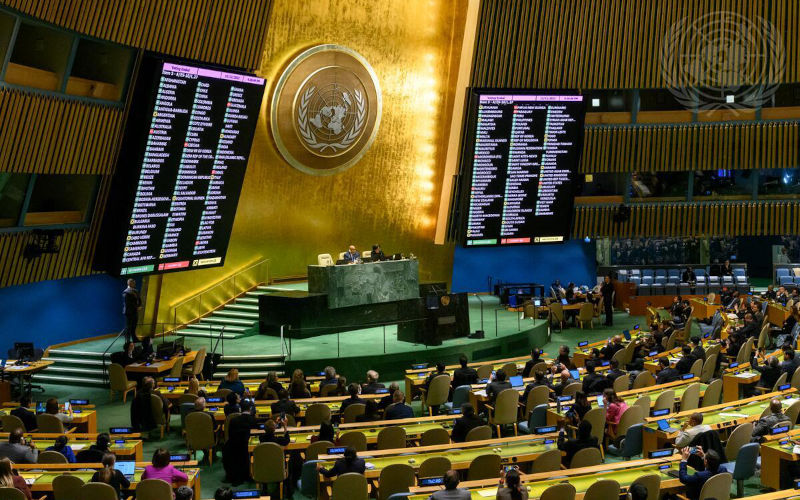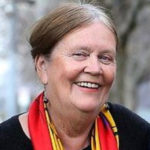Since coming to office in 2022, the Albanese Governments foreign policy has been dominated by its enthusiastic embrace of the AUKUS agreement with old allies, the United States and the United Kingdom. However these nations are totally out of step with global opinion about gross breaches of international law by the Netanyahu regime and neither has been able to influence Israel to at least consider alternatives to the ongoing catastrophic war.
Since October 7th, Australia has been predictably loyal to its allies in its response to the Middle East crisis both at the United Nations and in cautious statements for its domestic audience.
However the ongoing assault on the Palestinian people finally forced the government to confront its friends and advise that Australia too would vote for a ceasefire.
Full credit must go to the Foreign Minister Penny Wong who is a rational and diplomatic voice at the Cabinet table. However there have been other significant influences in persuading senior government ministers that Australia can no longer rely on its traditional allies to resolve this unprecedented conflict.
Firstly ministers must have been aware of the chorus of influential voices from around the nation asking for leadership in upholding Australia’s standards of peace and security. Secondly there must have been concern in government that Australia was becoming extremely isolated in our region in failing to challenge the behaviour of the Israeli government
The multicultural changes in Australian society over past decades means that no national government can automatically assume the electorate will agree with the priorities of our traditional allies. With one third of the population born overseas and significant immigrant populations from India, China, Philippines, Nepal ,Vietnam, Hong Kong, Pakistan and South Africa, Australian foreign policy needs to respond to diversity and reflect the priorities of many nations.
Similarly we know that South Pacific and South East Asian neighbouring governments have expressed some reservations and concern about our defence policy becoming so locked into that of the United States and United Kingdom.
Our independent vote at the United Nations General Assembly last week will be seen as some welcome reassurance that Australia does not automatically follow its powerful friends.
No doubt there are remaining voices of dissent within the Albanese Government still barracking for the usual reliance on militarism to resolve human conflict .
But perhaps there is also some recognition too that neither the Australian electorate nor our regional neighbours want to see war as the answer to complex inter-nation disputes.
It is unsurprising that the key belligerents in global disputes are male ….old or young, their very masculinity seems to be threatened by any rational advocacy for conflict resolution. Yet the United Nations itself has recognised the need for women to be more influential in global conflict by bringing protagonists together to find peaceful resolution of conflict
Over twenty years ago the U.N Security Council recognised the importance of women’s role in maintaining global peace and security and, in agreeing to UN 1325, all nations were asked to formulate Women, Peace and Security Action Plans and more than 90 countries have done so.
Reports indicate positive peace building efforts by women in South Sudan, Lebanon, Kosovo, Mali, Central African Republic and Haiti. In our own region the role of women was significant in resolving conflict in Bougainville.
It is worth noting that both Israel and the United States have Women Peace and Security Action Plans, yet there is no indication to date that women leaders have been called upon to lead peace negotiations. Yet just prior to the Hamas attack, there were relations of peace between Israeli and Palestinian women which surely urgently need official endorsement.
Women in the global community have good reason to be sceptical about genuine progress in official acceptance of Women, Peace and Security Action Planning.
Some refer to it as “mere window dressing“ or worse “a toothless bulldog”, yet with nine subsequent UN resolutions declaring women essential in peace building, now is surely the time to give women negotiators the opportunity to search for fresh ways to resolve conflict.
Australia has started to retrieve its reputation as a nation with courage and imagination in times of conflict so it could initiate debate in the closing hours of the United Nations General Assembly for women to be authorised to lead peace negotiations in the Middle East.
Every war ends with compulsory peace talks, so it’s time both Hamas and the Israeli Defence Force stepped aside for women to resolve this war which as usual disproportionately impacts on civilians. Both sides are guilty of atrocities and to date that has been the focus of worldwide preoccupation.
However It must be time to give peace a chance and frankly I would “trust the women“ whose patience and perseverance is so often ignored.
Margaret Reynolds has a long commitment to the peace movement dating back to the Anti-Vietnam Moratorium to current advocacy against militarism as National President of Women’s International League for Peace and Freedom.(Australia )
She was a Labor Senator for Queensland 1983-1999 and a member of Bob Hawke’s Ministry 1987-1990. She taught Human Rights and International Relations at University of Queensland 1999-2004 and has worked with a number of international non-government organisations.

